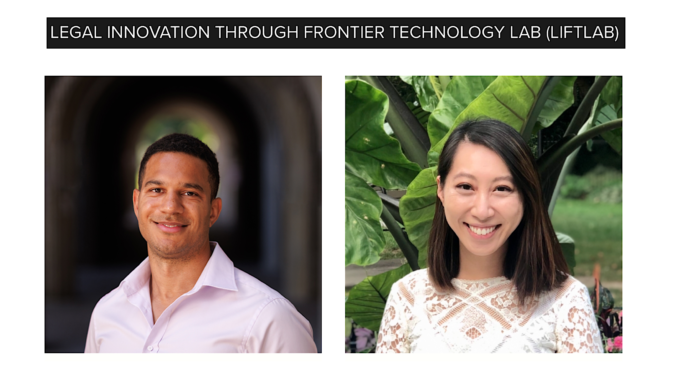
Stanford Law School has launched a new research project, the ‘Legal Innovation Through Frontier Technology Lab’, or Liftlab, to explore how AI can reshape legal services for the better.
The project led by Professor Julian Nyarko and Executive Director Megan Ma (pictured), stressed that the goal was not just to make legal services ‘faster and cheaper, but better and more widely accessible’. Although, one could say that to make legal services more accessible will mean making them more affordable, and in turn faster and easier to access. Either way, it’s a welcome move and builds on the work that Stanford’s CodeX legal tech group has already done.
They added that Liftlab will ‘unite research, prototyping, and real-time collaboration with industry’ around legal AI and will seek to explore ‘AI’s potential to fundamentally change the way legal work serves society’….which goes back to the point about faster and cheaper, given that most people can’t access legal services beyond the most basic areas due to their cost. And even if they do get a lawyer they can afford initially, the whole process is so complex and long, including because of court processes, that it starts to become unaffordable.
Of course, one could also say that the huge imbalance in access to justice in the West is a reflection of the equally huge economic imbalances across society as a whole – and that historically, legal rights, although on paper for everyone, have tended to be exercised by those with the most capital. I.e. the socio-economic pyramid of society is reflected directly into access to justice. Can we help create more balance via legal AI…? Can tech help level the playing field in what is an environment excessively stacked in favour of those with the most money to expend? Let’s hope so.
(As an aside, one could also argue: do we really live in a democracy if there is little access to justice? Or where large corporations and governments can crush an individual’s or small business’s rights via the exercise of their financial resources through the legal system? Presumably the point in having legal rights as a member of a democratic society is that you can wield them as well and not just vote every four or five years? Otherwise, as noted, is it really a democracy, or just a plutocracy with ‘democratic adornments’?)
They added that Liftlab’s founding advisors include Harvey, Cleary Gottlieb, Davis Wright Tremaine and Vorys, among others.
And beyond the aspirations of ‘more widely accessible’ legal services are some very practical and technical focus areas, which include:
- Legal Personas: We are examining the potential of large language models (LLMs) to elicit, synthesize and encode implicit knowledge held by experienced practitioners. Our aim is to assess the extent to which such tailored models can serve as effective representations of expert judgment, thereby advancing both empirical understanding and methodological development in the study of legal practice.
- Contractual Drafting Risk Assessment (via MCC): We are employing AI to identify common causes of contract interpretation disputes, such as linguistic vagueness or indeterminacy. We then feed that information into the contract production process, in turn enabling legal personnel to write better contracts.
- Multi-Agent Simulation for Evaluation: We explore possible applications of agentic AI to the legal field, e.g. in analyzing the internal processes of law firms through simulations.
AI-driven simulation training (e.g. DealMentor): We are developing and evaluating AI training platforms to enable young attorneys and law students to master negotiation and other skills in legal practice through simulation tailored to real-world scenarios. - Applied Mechanistic Interpretability in Legal Contexts (e.g. Breaking Down Bias): We are developing novel approaches to identifying and mitigating racial bias in LLMs. Using a method known as model pruning (dissecting the internal structure of LLMs), we selectively deactivate or remove specific neurons that were identified as contributing to biased behavior.
Commenting on the project, Prof Nyarko said: ‘The legal profession has not just an opportunity, but an obligation, to do more than just boost efficiency. We want to understand how technology can surface the expertise and reasoning that underpin the legal system in order to deliver better legal advice, prevent disputes, efficiently train new lawyers, and share the kinds of strategic insights that today only experienced practitioners tend to be able to leverage.’
And Prof Ma added: ‘Our collaborations allow us to develop tools shaped by actual user needs and capable of delivering meaningful value in professional settings. They also help bring transparency and clarity to the metrics that define quality. Many law firms are eager to experiment with AI tools, but lack the time or infrastructure to evaluate these tools rigorously. That’s where we come in: offering a research-backed, neutral space to test, refine, and develop what actually works.’
You can find more info here.
—
Legal Innovators Conferences in London and New York – November ’25
If you’d like to stay ahead of the legal AI curve then come along to Legal Innovators New York, Nov 19 + 20 and also, Legal Innovators UK – Nov 4 + 5 + 6, where the brightest minds will be sharing their insights on where we are now and where we are heading.
Legal Innovators UK arrives first, with: Law Firm Day on Nov 4th, then Inhouse Day, on the 5th, and then our new Litigation Day on the 6th.


Both events, as always, are organised by the Cosmonauts team!
Please get in contact with them if you’d like to take part.
Discover more from Artificial Lawyer
Subscribe to get the latest posts sent to your email.